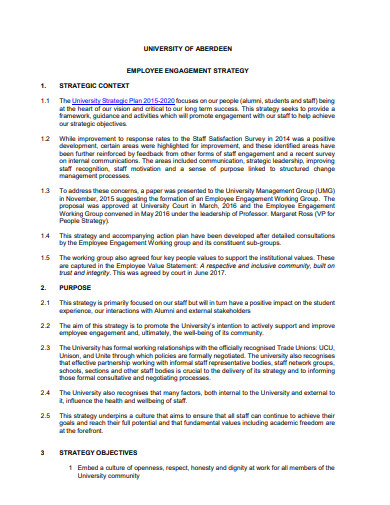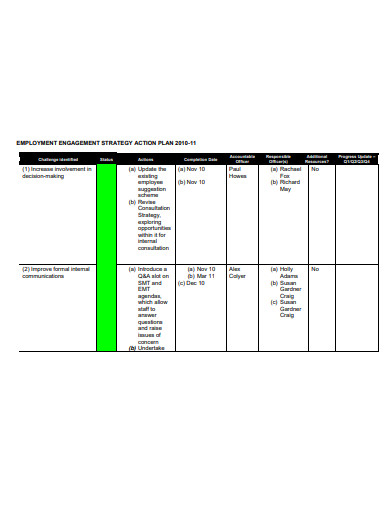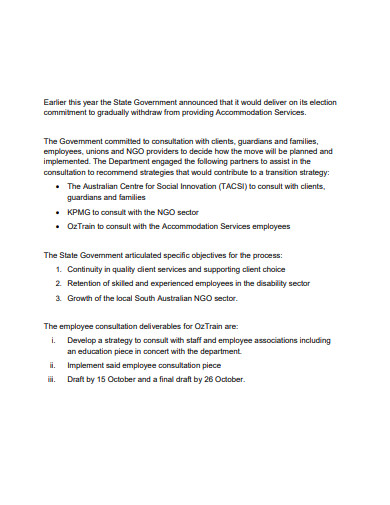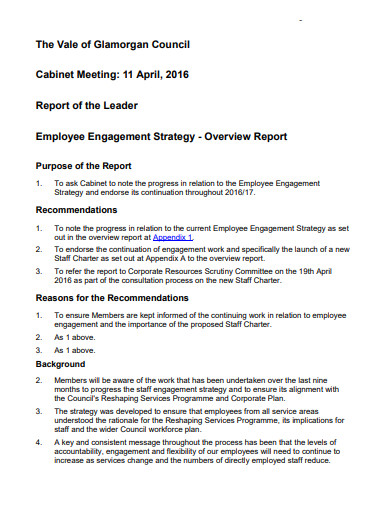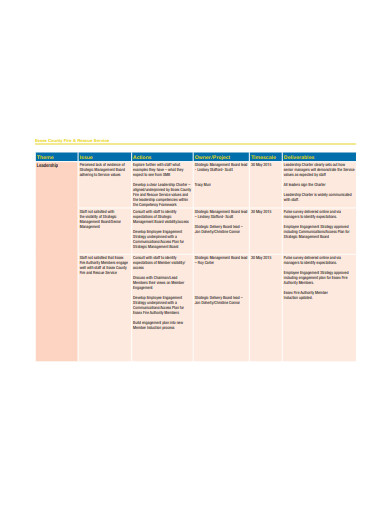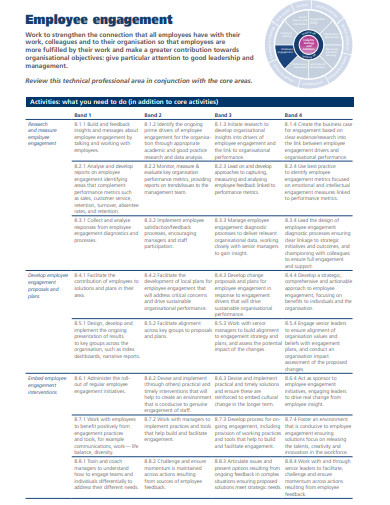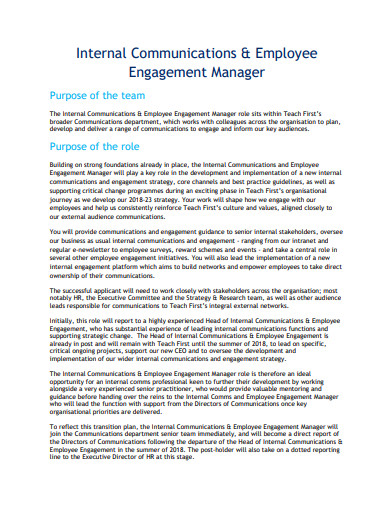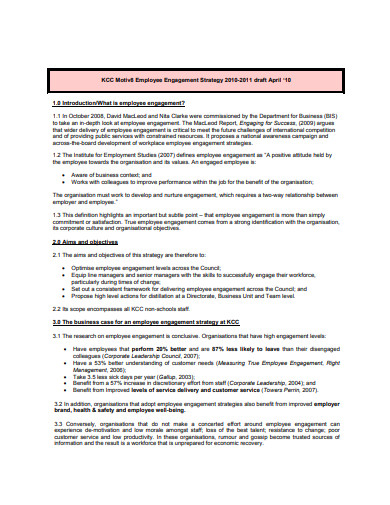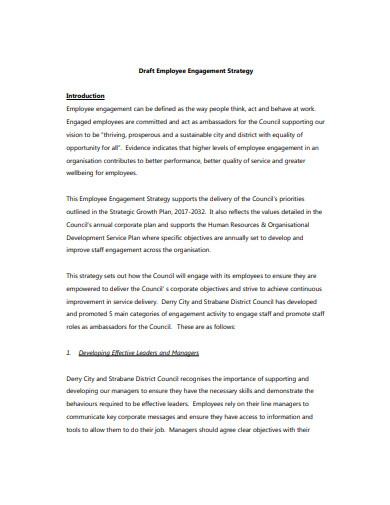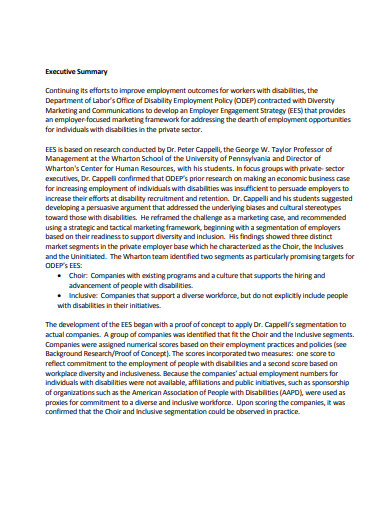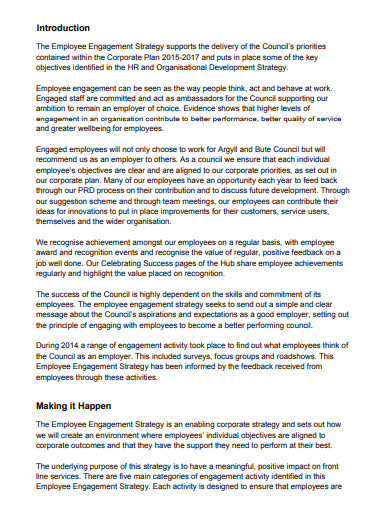10+ Employee Engagement Strategy Examples to Download
Nowadays, when people hear the word “work,” they often incorporate it with the word “stress.” A survey done by Korn Ferry about work-related stress revealed that the employees’ stress levels had mounted to 20% in the last three decades. So the question is, is it possible to make work engaging? If it is, then how? The level of employee engagement is directly proportional to the productivity of your company. Given this, it is right to say that for your company to have a high productivity level, you must keep your employees continuously engaged. To do that, you need to develop a powerful employee engagement strategy,
What Is an Employee Engagement Strategy?
The term employee engagement refers to the commitment of the employees to achieve their company’s goals. It happens when employees have a strong connection to the company, and when they yearn for the company’s improvement as much as of their own. You can’t expect to achieve this much engagement from your employees if you don’t take any action. To achieve this level of commitment, the employer should develop a strategy. An employee engagement strategy is a plan that aims to increase your employees’ commitment to your company.
Employee engagement leads to higher quality of services, which would result in an increase in satisfaction in customer experience and an upsurge in sales. If your strategy ends up being successful, you could expect your company’s productivity to increase in the upcoming months.
10+ Employee Engagement Strategy Examples
1. Employee Engagement Strategy
2. Employee Engagement Strategy Action Plan
3. Employee Engagement Strategy Example
4. Employee Engagement Strategy Report
5. Employee Engagement Strategy Action Plan Format
6. Sample Employee Engagement Strategy
7. Employee Engagement Manager Strategy
8. Employee Engagement Strategy Format
9. Draft Employee Engagement Strategy
10. Employee Engagement Strategy Final Report
11. Basic Employee Engagement Strategy
How to Nurture Employee Engagement
Keeping your employees engaged is a long and difficult process. You can’t just give them free food or a present and expect them to be engaged the next day. It is something that needs to be built on a foundation and nurtured. Follow these steps to constantly keep your employees engaged with your company.
1. Uphold the Company’s Mission, Vision, and Core Values
Every organization has its mission statement, vision, and core values. These three have different meanings and significance to the company. The mission states the objectives and the means to achieve it. The vision expresses the company’s plans and how it affects the goals of the company. And lastly, the core values are the principles that people who belong to the organization should follow. By promoting awareness of these three, it could make your employees feel that they are working for something greater than themselves, which could influence them to contribute for the greater good of the company.
2. Acknowledge Outstanding Performances
Employee recognition could go a long way. It doesn’t always have to be a grand gesture—a simple “you did a great job”, a good review, or a thank you card would do the trick. Highlighting their achievements would make your employees feel that they matter and that they are valued. On the other hand, underappreciating your employees could lead to a decline in their performance, which would negatively impact your business.
3. Offer Them a Place to Grow
Nobody wants to stay stagnant; everybody craves for improvement. Employees continuously look for opportunities to grow and develop, and your company should be able to offer them that. To keep your employees engaged, you should be able to make them feel that the company is also invested in their career.
4. Stay Transparent
Transparency is important. For your employees to be fully invested in your company, you should not keep them in the dark. As a part of the company, they would want to know if anything important is happening behind closed doors. As employees, it is their right to know any decisions that would affect them. Aside from being transparent, it is also important to make your employees feel that their voices are heard. Communication should flow both ways in your company. For this reason, you should attend to the feedbacks, suggestions, and concerns of your employees.
5. Promote Camaraderie
Teamwork is needed to maximize the efficiency of your company. The secret behind successful teamwork is good camaraderie between the team members. If your employees can foster a good relationship with each other, it wouldn’t be difficult for them to work to reach a common goal. By forming strong relationships within the company, you can foster an engaged workforce.
What are the elements of employee engagement?
The elements of employee engagement are the areas that should be focused on and supported by the organization to keep the company engaging. These elements include leadership, culture, communication, recognition, an opportunity for growth, accountability, values, and the vision of the company. Employee engagement will surely be established if your company succeeds in improving in these areas.
What is an employee engagement activity?
Employee engagement activities are a set of activities that could effectively increase the sense of responsibility and engagement of your employees. Every company needs to set aside enough budget and resources for these activities. Prioritizing these activities could pave the way for creating an engaging environment for your prized employees.
What are some employee engagement activities?
Organizing events, doing project collaborations, promoting the wellness of your workplace, redecorating your workplace, creating opportunities for mentorship, and giving certificates to outstanding employees are some of the examples of employee engagement activities. In addition, you should also practice organizing staff training, bringing in motivational speakers, and getting involved in community service for your company to achieve a competitive workforce.
In establishing engagement between an employee and a company, both parties should meet half-way. The employee and the company should show that they care about each other’s well being. An engaging workplace could lead the employees to cultivate a personal connection to the company, which would increase their performance level and would consequently reflect the company’s productivity. A powerful engagement strategy could establish an employee and staff engagement that wouldn’t easily waver.



